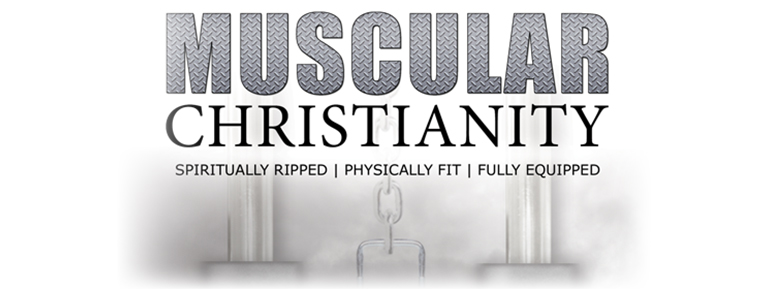What Does it Mean to be Saved? | Part III
I) Intro
Hey guys, Bruce Gust, Muscular Christianity.
This is Part Three of a three-part series pertaining to Salvation.
In Part One we looked at what does it mean to be saved. In Part Two we talked about how you get saved and listen, while all of this is important, Part Two is absolutely crucial because you want to base your identity in Christ on what it says in the Word of God.
Contenting yourself with the idea that you’re born again just because you’re comfortable repeating the same words a demon would say about the Resurrection of Christ is not in line with what Scripture says as far as, not just confessing with your mouth, but believing in your heart that God raised Jesus from the dead.
When you believe something in your heart, the death and resurrection of Christ is no longer just a historical fact. Rather, it’s a personal reality and that’s what you need to ensure is in place in order to qualify as someone who is truly born again.
So, be sure to out to MuscularChristianityOnline.com, click on Podcast Notes, find that particular episode and look at the Scriptures that are either being referred to specifically or what’s referred to in the Notes. You don’t want to overlook those things that define a saving faith as defined in the Bible and instead be placing your confidence in a meaningless sound bite.
Now let’s take a look at Part Three: How do You Know that You’re Saved?
II) The Wrong Side of the Road
Imagine you’re driving on the wrong side of the road, right?
A police officer comes up alongside you and tells you to pull over.
All right.
Now imagine that instead of pulling over, you just roll your window down, you yell out the window, “Hey, I’m sorry,” and then you continue driving just as you were before.
Ridiculous, right?
But this is the way some process sin. Their driving on the wrong side of the road isn’t a real problem, at least as far as it being something that needs to be forgiven.
And if they are willing to concede that they need to have a little talk with Jesus, they don’t really ask for forgiveness as much as they just go through the motions so they can feel better about themselves.
They’re not willing to confess that they’re doing anything wrong.
Just like that scenario where the police officer is saying, “Hey, you need to get back in your lane or you need to pull over,” they not see that as being something that they need to respond to.
It isn’t a problem.
They don’t recognize God as an Authority, they’re not changing their behavior – they’re not pulling over.
And you see all of this captured in 1 John 3:6
No one who lives in him keeps on sinning. No one who continues to sin has either seen him or known him. (1 Jn 3:6)
In other words, if you’re not pulling over when the spirit of God motions you to the side of the road, you’re either a very immature Christian and discounting the reality of sin or you don’t have the Holy Spirit living in you, which means you’re not saved.
Bear in mind, John isn’t saying that unless you’re a morally perfect individual that you’re not born again (Rom 7:14-25). What he is saying is that if you ignore God’s Voice, whether it be something documented specifically in Scripture or that sense of hesitation, you feel that’s prompted by God’s spirit, which is called Conviction (Jn 16:8).
When you feel that, if you’re not stopping, if you’re not pulling over, well, then something’s off.
How do you know you’re saved?
Ask yourself if you pull over and if you’re willing to acknowledge your shortcomings when God points them out and then make the necessary changes to your behavior in the aftermath.
Do you pull over?
III) What About Those Situations Where You’re Not Really Doing Anything Wrong, But…
And listen, human beings are guilty of occasionally making conclusions based on a very subjective collection of criteria. There are times where you might be doing something that, to other people, looks positively wrong and suddenly you’re being criticized for something you don’t believe to be a problem.
How do you navigate that kind of situation?
A) Eating Meat
Here’s the thing: In First Corinthians (1 Cor 10:23-33), Paul addresses a situation where new believers were having a hard time with those who were eating a piece of meat that had been used as part of a pagan religious ceremony.
In their minds, to eat that meat was indirectly engaging in idolatry and it was a real problem for them. And it wasn’t because they were being overly particular. This was something that was a part of their culture and now, having been born again, they’re looking at everything through a new set of eyes and they’re seeing this as a sin.
Thing is, not everyone is seeing that way but for those who are hesitating, they’re now vulnerable to make some concessions that are sinful because of the way they’re processing this situation as permission to “bend the rules.”
Paul reinforces the idea that to view the meat as tainted is ridiculous for any one of a number of reasons, but…
If you know you’re in the presence of someone who’s struggling with this situation, Paul encourages those who are more mature in their thinking to simply abstain from eating the meat if they know it has the potential to be perceived as a problem.
The bottom line being that you want to promote the spiritual growth of those who are new to the faith, not just for their sake, but also for the sake of being able to make God’s glory and prominence all the more appealing.
First Corinthians 10:31 says:
So whether you eat or drink or whatever you do, do it all for the glory of God. (1 Cor 10:31)
It’s not that you can’t eat meat, you just want to be sensitive in the way you exercise your freedom so your behavior doesn’t embolden someone to adopt a mindset that makes them all the more vulnerable to do something foolish (Rom 14:13-23).
Your priority needs to be God’s Reputation, and not your personal take on the matter.
And just as quick aside, the Bible refers to those who choose to be obstacles to someone else’s relationship with Christ as a “stumbling block.” Jesus talks about how things that make people “stumble” are inevitable, but you don’t want to be the one responsible for damaging someone’s faith:
6 “If anyone causes one of these little ones—those who believe in me—to stumble, it would be better for them to have a large millstone hung around their neck and to be drowned in the depths of the sea. 7 Woe to the world because of the things that cause people to stumble! Such things must come, but woe to the person through whom they come! (Matt 18:6-7)
Don’t make the mistake of thinking that your behavior is no one’s business but your own. You answer to your Heavenly Father and you want to be aware of how you’re coming across – not just for the sake of keeping a safe distance between you and the devil, but also to ensure you’re a compliment to what God would do in the lives of others and not a distraction from it.
B) Making Excuses
There are times, however, when we are falling short, although we don’t want to admit it.
We justify ourselves by saying that we’re not “really” doing anything wrong, and it can be fairly easy to convince those who might be concerned that their apprehension is totally ill-founded because of the way in which our true motives can be easily concealed with the right kind of verbiage.
Granted, this can get into some subjective territory, but you’re not playing to win when you’re doing things that make it easier to lose. And when you’re not just contemplating concessions but actually doing things that make those compromises more likely, then you have to ask, “Whose team am I playing for?”
You see that sentiment in Matthew 6:24:
“No one can serve two masters. Either you will hate the one and love the other, or you will be devoted to the one and despise the other. You cannot serve both God and money. (Matt 6:24)
If you’re doing something that equates to intentionally walking every batter right up to the point where the bases are loaded, you’re not resisting the devil, you’re cooperating with him.
James 4:7 says:
Submit yourselves, then, to God. Resist the devil, and he will flee from you. (Jas 4:7)
Romans 13:14 says:
Rather, clothe yourselves with the Lord Jesus Christ, and do not think about how to gratify the desires of the flesh. (Rom 13:14)
There’s a timeline that James outlines in chapter one which traces how sin begins with a thought, then morphs to a plan and finally to an action:
but each person is tempted when they are dragged away by their own evil desire and enticed. 15 Then, after desire has conceived, it gives birth to sin; and sin, when it is full-grown, gives birth to death. (Jas 1:14-15)
Being tempted isn’t a sin, but once you start dwelling on it and maneuvering things around that better accommodate the possibility of the enemy putting some points on the board, even if you’ve yet to cross “the” line, according to Scripture you’ve nevertheless crossed “a” line by allowing a sinister concession to make it’s way past your mind and into your heart where you’re physically opening doors that should remain locked.
Jesus says in Matthew 5:28 that if you look at a woman lustfully, you’ve already committed adultery in your heart. On the surface that looks a little harsh and maybe even somewhat absurd. But when you contemplate what the “heart” is from a biblical perspective, it makes more sense in that you’re now at that point that James refers to when “desire has conceived.”
Matthew Henry’s Commentary on Christ’s comment in the Sermon on the Mount elaborates on that by saying:
This command forbids not only the acts of fornication and adultery, but, (1.) All appetites to them, all lusting after the forbidden object; this is the beginning of the sin, lust conceiving (James 1 15); it is a bad step towards the sin; and where the lust is dwelt upon and approved, and the wanton desire is rolled under the tongue as a sweet morsel, it is the commission of sin, as far as the heart can do it… (2.) All approaches toward them; feeding the eye with the sight of the forbidden fruit; not only looking for that end, that I may lust; but looking till I do lust, or looking to gratify the lust, where further satisfaction cannot be obtained. (“Bible Study Tools”, “Matthew Henry Commentary on the Whole Bible”, https://www.biblestudytools.com/commentaries/matthew-henry-complete/matthew/5.html, accessed October 7, 2023)
These aren’t just “impure thoughts,” this is you intentionally fumbling the ball and giving the other team a chance to score.
No, not everything is black and white. But, then again, God never has to speculate and since He sees the heart (1 Sam 16:7) and no man can serve two masters (Matt 6:24), you can rest assured that however you may be able to successfully convince another human being that things aren’t as they seem, God has full access to both your actions and your motives and you’re either promoting His Reputation or protecting your own.
Period.
In her article, “The Difference Between Guilt and Conviction,” Jeanne Harrison, a staff writer at Grace Church in Orlando, does a great job of shutting down all the white noise and allowing the Truth that is central to this whole debate be heard in a way that’s easy to hear and understand…
Here’s the difference between guilt and conviction: guilt is not willing to pay the price of repentance. Guilt wants to make the problem go away as painlessly as possible because guilt’s primary focus is me. What will they think of me? How will the consequences impact me?
Conviction focuses on God. We begin to experience conviction when our hearts are grieved not solely because we might lose our job, or our spouse, or our standing, but because we have broken fellowship with God. In 2 Corinthians 7:10 Paul captures the difference between guilt and conviction by describing two different kinds of sorrow. He writes, “Godly sorrow brings repentance that leads to salvation and leaves no regret, but worldly sorrow brings death.”
The question is, why are you lamenting over your sin? Is it because you fear losing the things of the world—the respect of your boss, the esteem of performing perfectly, the pleasure of sin itself? If so, you are experiencing worldly sorrow. Or are you pained because you have personally grieved God’s heart? This kind of godly sorrow takes us straight to the cross—to repentance, restoration, and life.
In order for me to repent, I had to care more about my relationship with God than I did about my reputation.
Again, you’re hearing the question: “Do you pull over?”
If your primary concern is your relationship with Christ and the way you’re making Him look in the eyes of those who are on the outside looking in, then your priorities will be reflected in your actions and you’re either avoiding a bad situation altogether, or you’re reinforcing both your resolve to obey and the Reputation of your King by establishing some accountability so everything can be seen for what it truly is and you can be successful where you might otherwise be prone to fail (Prov 27:17; Ecc 4:9-12; Gal 6:1-2; Heb 10:24; 13:17; 1 Pet 5:5).
IV) Conclusion
Listen, being born again translates to more than just the ability to avoid the otherwise inevitable punishment awaiting you in hell. It’s a Divine suite of perks, advantages and opportunities that can be categorized under four headings: Purpose, Perspective, Peace and Power.
Your sense of Purpose is improved because you know that it’s God working in and through you (Phil 2:13).
Your perspective is different because you’re now not viewing things exclusively according to your circumstances, but you’re seeing things in the context of how God is moving (Ps 139:16; Jn 5:17; Eph 2:10).
You’re not as apt to be anxious because you know that God is in charge and you have access to a Divine Source of Strength that allows you to endure and excel in ways that go beyond what you’re capable of on your own (Is 41:10; Jn 14:12; Col 1:29).
What does it mean to be saved?
The Holy Spirit is living in and through you.
How do you get it done?
You believe and you believe in a way where you’re not just changing your mind, rather you let God change you by believing in your heart.
And how do you know you’re saved?
You pull over when God motions you to stop and you change the way you’re driving.
Again, for more detail and Scripture, head out to muscularchristianityonline.com and look under the Podcast Show Notes.
I’m Bruce Gust. This is Muscular Christianity.
Let’s go make a difference.








You must be logged in to post a comment.